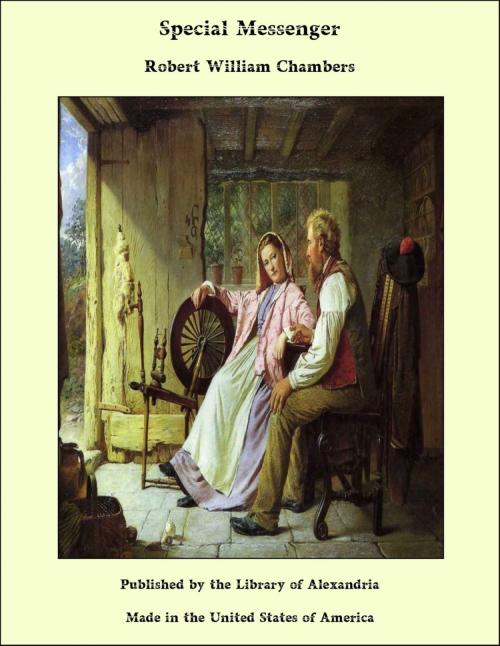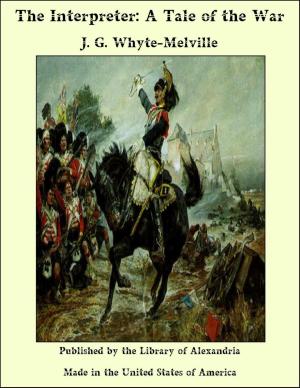| Author: | Robert William Chambers | ISBN: | 9781465609090 |
| Publisher: | Library of Alexandria | Publication: | March 8, 2015 |
| Imprint: | Language: | English |
| Author: | Robert William Chambers |
| ISBN: | 9781465609090 |
| Publisher: | Library of Alexandria |
| Publication: | March 8, 2015 |
| Imprint: | |
| Language: | English |
About five o’clock that evening a Rhode Island battery clanked through the village and parked six dusty guns in a pasture occupied by some astonished cows. A little later the cavalry arrived, riding slowly up the tree-shaded street, escorted by every darky and every dog in the country-side. The clothing of this regiment was a little out of the ordinary. Instead of the usual campaign head gear the troopers wore forage caps strapped under their chins, heavy visors turned down, and their officers were conspicuous in fur-trimmed hussar tunics slung from the shoulders of dark-blue shell jackets; but most unusual and most interesting of all, a mounted cavalry band rode ahead, led by a bandmaster who sat his horse like a colonel of regulars—a slim young man with considerable yellow and gold on his faded blue sleeves, and an easy manner of swinging forward his heavy cut-and-thrust sabre as he guided the column through the metropolitan labyrinths of Sandy River. Sandy River had seen and scowled at Yankee cavalry before, but never before had the inhabitants had an opportunity to ignore a mounted band and bandmaster. There was, of course, no cheering; a handkerchief fluttered from a gallery here and there, but Sandy River was loyal only in spots, and the cavalry pressed past groups of silent people, encountering the averted heads or scornful eyes of young girls and the cold hatred in the faces of gray-haired gentlewomen, who turned their backs as the ragged guidons bobbed past and the village street rang with the clink-clank of scabbards and rattle of Spencer carbines. But there was a small boy on a pony who sat entranced as the weather-ravaged squadrons trampled by. Cap in hand, straight in his saddle, he saluted the passing flag; a sunburnt trooper called out: “That’s right, son! Bully for you!” The boy turned his pony and raced along the column under a running fire of approving chaff from the men, until he came abreast of the bandmaster once more, at whom he stared with fascinated and uncloyed satisfaction. Into a broad common wheeled the cavalry; the boy followed on his pony, guiding the little beast in among the mounted men, edging as close as possible to the bandmaster, who had drawn bridle and wheeled his showy horse abreast of a group of officers. When the boy had crowded up as close as possible to the bandmaster he sat in silence, blissfully drinking in the splendors of that warrior’s dusty apparel.
About five o’clock that evening a Rhode Island battery clanked through the village and parked six dusty guns in a pasture occupied by some astonished cows. A little later the cavalry arrived, riding slowly up the tree-shaded street, escorted by every darky and every dog in the country-side. The clothing of this regiment was a little out of the ordinary. Instead of the usual campaign head gear the troopers wore forage caps strapped under their chins, heavy visors turned down, and their officers were conspicuous in fur-trimmed hussar tunics slung from the shoulders of dark-blue shell jackets; but most unusual and most interesting of all, a mounted cavalry band rode ahead, led by a bandmaster who sat his horse like a colonel of regulars—a slim young man with considerable yellow and gold on his faded blue sleeves, and an easy manner of swinging forward his heavy cut-and-thrust sabre as he guided the column through the metropolitan labyrinths of Sandy River. Sandy River had seen and scowled at Yankee cavalry before, but never before had the inhabitants had an opportunity to ignore a mounted band and bandmaster. There was, of course, no cheering; a handkerchief fluttered from a gallery here and there, but Sandy River was loyal only in spots, and the cavalry pressed past groups of silent people, encountering the averted heads or scornful eyes of young girls and the cold hatred in the faces of gray-haired gentlewomen, who turned their backs as the ragged guidons bobbed past and the village street rang with the clink-clank of scabbards and rattle of Spencer carbines. But there was a small boy on a pony who sat entranced as the weather-ravaged squadrons trampled by. Cap in hand, straight in his saddle, he saluted the passing flag; a sunburnt trooper called out: “That’s right, son! Bully for you!” The boy turned his pony and raced along the column under a running fire of approving chaff from the men, until he came abreast of the bandmaster once more, at whom he stared with fascinated and uncloyed satisfaction. Into a broad common wheeled the cavalry; the boy followed on his pony, guiding the little beast in among the mounted men, edging as close as possible to the bandmaster, who had drawn bridle and wheeled his showy horse abreast of a group of officers. When the boy had crowded up as close as possible to the bandmaster he sat in silence, blissfully drinking in the splendors of that warrior’s dusty apparel.















